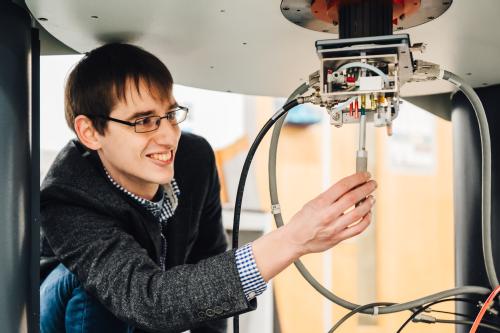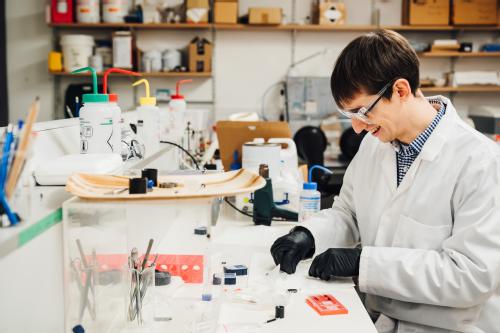Press Releases
£1.4 million funding will enable University of Warwick scientist to develop next-generation batteries and solar panels
The University of Warwick will be at the forefront of research into fast-charging batteries and solar power thanks to a £1.4 million grant.
Dr Michael Hope from Warwick’s Department of Chemistry is the recipient of the new grant, which will investigate more efficient and durable materials in sustainability devices, such as solar panels.
The aim of Dr Hope’s research is to find ways to drive the transition to clean, renewable energy through cheaper and more efficient ways of harnessing and storing energy. This is limited by the properties of current materials.
Dr Hope will use solid-state nuclear magnetic resonance (NMR) spectroscopy to study the atoms in the materials that make up sustainable tech, like batteries and solar panels. This is a technique similar to MRI scanning, which probes individual atoms within materials.
By studying these materials at an atomic level, research like Dr Hope’s hopes to help create cheaper and more efficient energy materials. Dr Hope said: “I will focus on materials for energy storage and generation including batteries and solar cells. Using NMR I will reveal the structural factors that limit the performance of these materials in real-world applications, thereby guiding the design of improved materials.
Dr Hope said: “I will focus on materials for energy storage and generation including batteries and solar cells. Using NMR I will reveal the structural factors that limit the performance of these materials in real-world applications, thereby guiding the design of improved materials.
“I am particularly excited to combine the development of new NMR methodologies to study cutting-edge materials under operational conditions.”
The grant is funded by the Engineering & Physical Sciences Research Council (EPSRC).
By studying the structure of the materials in devices at the atomic level, Dr Hope will link the structure to the materials properties that dictate how well they perform. This will help to design new materials with better performance.
One of the materials Dr Hope will focus on will be hybrid perovskites. Hybrid perovskites offer the promise of next-generation solar cells with higher efficiency and lower production costs than the current silicon-based options. However, their commercialisation is held back by how much they degrade under normal conditions, particularly exposure to light.
Solar panels are currently made of incredibly pure silicon, which requires expensive processing to produce. New materials that are more tolerant of impurities offer the promise of cutting the cost of solar power.
By championing sustainable research, such as Dr Hope’s vital work on batteries and solar cells, The University of Warwick is committed to creating a more sustainable world. Its Strategy 2030 sets out five key sustainability pathways to follow, including achieving Net Zero carbon emissions from scopes 1 and 2 by 2030, and scope 3 by 2050.
Find out more about Dr Hope’s research here: https://warwick.ac.uk/fac/sci/chemistry/staff/michaelhope/
15 July 2024
